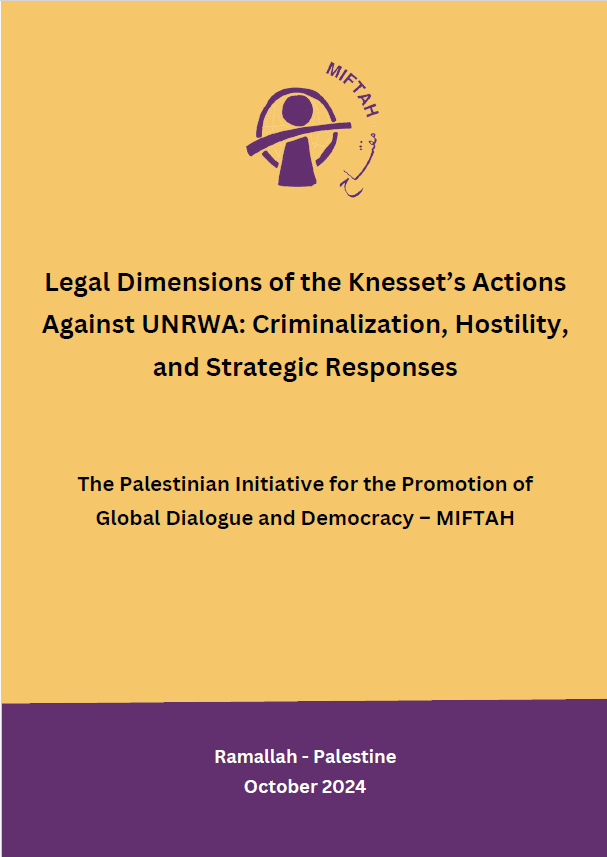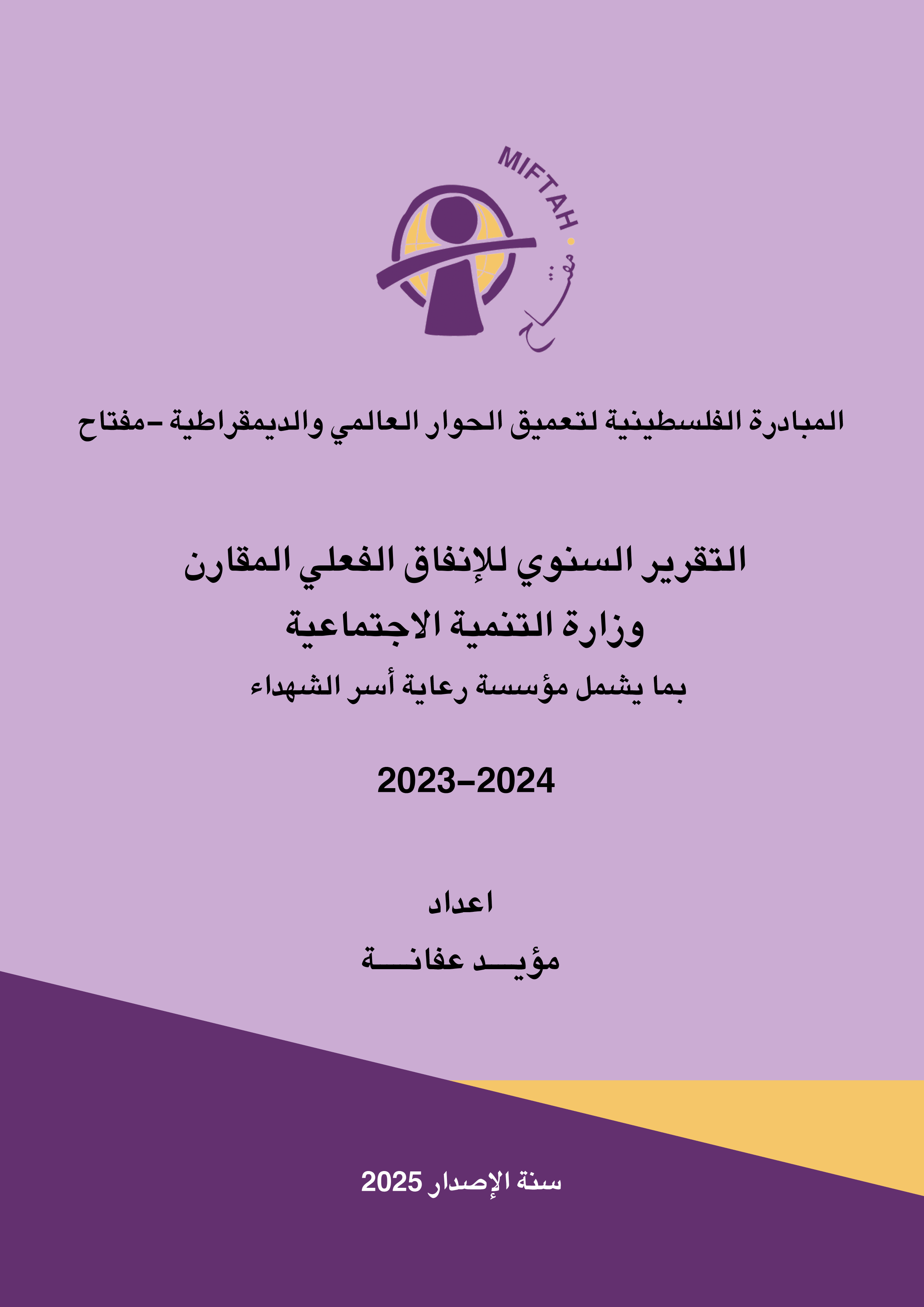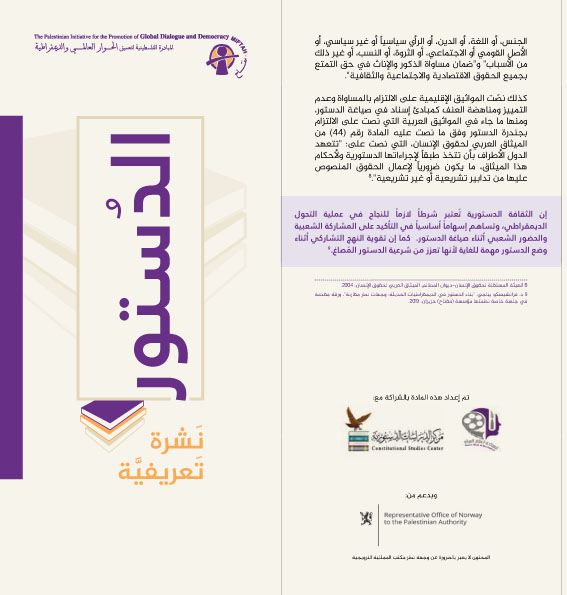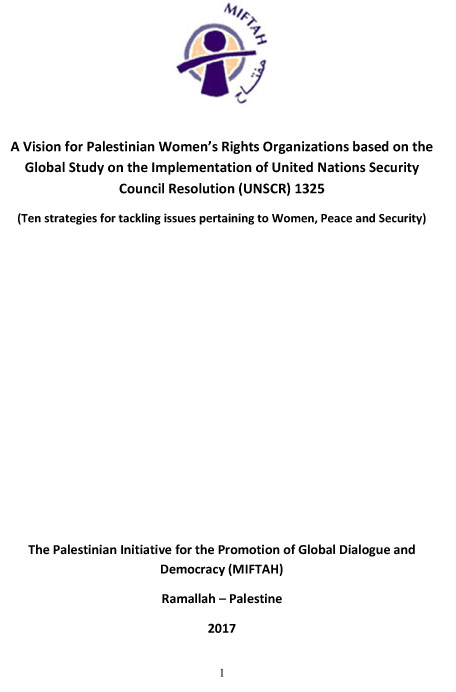The Opinion and Editorials section is strictly focused on providing timely and analytical opinion-editorials, mostly, but not exclusively, drafted by MIFTAH’s writers; it includes op-eds written by people exclusively for the organization. The Opinion and Editorials section is a central feature of MIFTAH’s website, whereby a concrete effort is placed on providing accurate as well as challenging analysis on the situation in Palestine, Israel, as well as in the region.
Believing in Jerusalem
Date posted: May 27, 2013
By Joharah Baker for MIFTAH

Last week, Israel barred a UNESCO fact-finding mission from entering the country, charging that the Palestinians had ‘politicized’ the mission before it had even arrived. The mission was tasked with looking into conditions of historical sites in the Old City of Jerusalem, something Israel apparently found to be very threatening.
Looking at the state of Jerusalem’s eastern sector today, it is understandable why Israel would not want UNESCO or anyone else walking around the Old City, especially the Palestinian-populated parts of it. Because anyone who does, will see the devastation that Israel and its settlers have wreaked on one of the oldest and most beautiful cities in the world.
Excavation works are being conducted in and around the Aqsa Mosque to make way for more Jewish construction at the place where Waqf authorities say Ottoman and Abbasid artifacts have long been tucked away. A Muslim graveyard is being dug up just outside the Old City’s Jaffa Gate, to build – ironically – a museum of tolerance. Today, two stores were forcefully taken over by Jewish settlers in Al Hakari, one of the neighborhoods in the Muslim quarter and every day, it seems that more and more homes are either being demolished by Israeli municipality authorities or being taken over by Jewish settlers.
The “Judiazation” of Jerusalem is a term many Palestinians and Arabs use for what Israel is doing in the city. In a nutshell, it is the long-term plan Israel is gradually carrying out to change the Arab Palestinian character of Jerusalem. This means demolishing old and historical structures, displacing Palestinians, handing over their homes to settlers and trying to erase the Palestinian or Arab history of the city.
The sad truth is that, on the surface, Israel has succeeded in this to a large extent. Pockets of Jewish settlers now live in the heart of Muslim quarters and aim to take over more and more. Sheikh Jarrah, one of the more affluent Palestinian neighborhoods of Jerusalem, is now pierced with Jewish flags waving from homes that have been wrestled from their Palestinian owners, and Israel’s light rail train cuts right down through Palestinian neighborhoods outside of the city center. The train, of course, is not meant to service the Palestinian population but rather to connect Jewish neighborhoods and settlements in the city, but the area confiscated from Shufat and Beit Hanina for its construction simply fell into the plan.
What the UNESCO mission would not have seen even if they made it into the Old City is the overall humiliation that the Palestinian population of Jerusalem must endure on a daily basis because of Israel’s military occupation. Trips to the Israeli ministry of interior must be made just to prove that one lives in the city for fear that their residency rights may be revoked; young Palestinian men are stopped randomly by Israeli soldiers to check their ID cards or just to harass them, and settlers are always given the luxury of maximum security whenever they walk the streets. If settlers want to march through the city, the Palestinians are told to close their shops, are barred for hours from reaching their homes if they run along the path of the march and are always the ones blamed if any kind of confrontation between the two sides breaks out.
Jerusalem is being squeezed by these measures more and more each day. But there is always that glimmer of hope, that strength that shines through proving that all is not lost. On Shavuot, Israeli settlers and extremists poured into the Old City, singing loudly, banging on the shop doors and waving huge Israeli flags. The sight was disconcerting to say the least. However, the afternoon of that same day, at Damascus Gate, passersby were met with a completely different scene. Palestinian flags waved in determined Palestinian hands under the threatening eye of heavily armed Israeli police and soldiers. The youths were fearless, demanding freedom, with strong, unrelenting voices.
The sight of the Palestinian flag waving at the entrance to Damascus Gate was a breath of fresh air. All is not lost and never will be because hope is eternal and determination and strength come from a never-ending spring.
That day at Damascus Gate is what all Palestinians must keep in their minds’ eye in spite of the daily oppression of the occupation. No matter how many missions Israel bars from entering or how many houses it takes over, there will always be those brave souls who, despite the risks, will always raise Palestine’s flag.
Joharah Baker is a Writer for the Media and Information Department at the Palestinian Initiative for the Promotion of Global Dialogue and Democracy (MIFTAH). She can be contacted at mid@miftah.org.
Let Mohammed rest in peace
Date posted: May 20, 2013
By Joharah Baker for MIFTAH

There is no point falling into the pit of countering the claims being made about the death of Mohammed Al Durra, the 12-year old boy from Gaza whose videotaped killing was seen around the world. The boy, crouching in fear behind is equally afraid father as bullets whizzed around them, was killed admittedly by the Israeli army. Later, the army recanted after investigating the tape, saying Durra was killed by Palestinian fire instead. Well now, Israel is changing its story altogether, saying he was not killed at all. In fact, he was probably not even wounded and the French channel that broadcast the footage and brought some pretty bad rap to Israel, had most likely filmed a charade.
The reason why I will not waste my time countering this claim is that even with the great lengths the Israeli government went to to prove that the boy was never killed, it could not provide any irrefutable proof that Mohammed Al Durra – who would be 25 now – is still alive. No pictures, no testimonies, no hospital or morgue officials giving statements to refute his death, have been provided. Only sketchy information about ‘poor quality footage’ and the fact that it seems as though the boy moved his arm after he had slumped over his father following the explosion.
My point is this: indeed, Mohammed Durra’s death was at least one of the catalysts that fueled the second Intifada, and thus, was an important event in the history of the Palestinians. However, more importantly – most importantly to me –is the fact that this is about a boy who died in sheer terror, with his distraught father futilely trying to shelter him from the barrage of bullets coming their way.
Mohammed Al Durra was a boy, with a life, a family and friends. He died a horrible death and now he is being made to die a second one. I did not know Mohammed or his family, but I can only imagine how awful it must be for them to read these claims now and feel the pain of losing their child all over again. If nothing else, this is disrespect for human life of the worst kind.
Some may postulate that the rehashing of the Durra case is a personal jab at the French cameraman who shot the footage, Charles Enderlin. Perhaps. But as a Palestinian who has seen the pain endured by numerous families who receive the horrible news that their sons or daughters have been killed by the Israeli army, my concern is for his family and for his memory. He should be left to rest in peace. If Israel has axes to grind with French journalists or with the international community for holding it accountable for its actions, then so be it. Israel is not lacking in the public relations department.
That being said, there is just one decent thing left to do. Leave Mohammed Al Durra and his memory alone.
Joharah Baker is a Writer for the Media and Information Department at the Palestinian Initiative for the Promotion of Global Dialogue and Democracy (MIFTAH). She can be contacted at mid@miftah.org.
Recognition and justice is our demand
Date posted: May 13, 2013
By Joharah Baker for MIFTAH

This week Palestinians will commemorate Al Nakba, the catastrophe that befell the Palestinian people when Israel was founded. Every year, Palestinians hang placards pointing to the right of return, they carry keys symbolizing the homes they were forced to leave and could not return to and remember the Palestine that was lost to them 65 years ago.
This year will be no different. Every May 15, Palestinian recall their catastrophe and demand justice. They demand that they are granted the right of return for those who were made refugees virtually overnight and were then relegate to a life they did not choose. But more than anything, they demand recognition of the tragedy that befell them rather than a denial that it ever happened, or worse, that it was of their own making.
It has been 65 years since Israel was established in 1948, which means those who were cast into exile are either very old or have long passed. Those who experienced the Nakba are now few and far between, clinging to those few precious memories of a small garden in front of their house in Jaffa or of the salty smell of the sea in their neighborhood in Haifa. The rest of us are either descendants of these refugees or ordinary Palestinians who feel their cause is our cause because we are one people.
But the Palestinians have made one thing clear. The refugee issue will not die with the last refugee. It is felt nationwide, the loss, the injustice and the fact that those who were forced from their homes have mostly passed, longing for their beloved homes.
We cannot turn back time. What was lost has been altered, destroyed, changed or taken over by Israel’s newcomers. What we can do is hold on to the right to be recognized, for the injustice to be rectified in word and deed and for Palestine to never be lost in our minds or hearts.
Joharah Baker is a Writer for the Media and Information Department at the Palestinian Initiative for the Promotion of Global Dialogue and Democracy (MIFTAH). She can be contacted at mid@miftah.org.
We are proud of our Arab Idol
Date posted: May 06, 2013
By Joharah Baker for MIFTAH

Almost every Palestinian I know has fallen in love with Mohammed Assaf. Charismatic, young, confident and with a set of pipes that can blow your socks off, Assaf has shot to stardom and has become one of Palestine’s most beloved treasures. The 22-year old Gazan has made it to Arab Idol’s coveted Top Ten and for good reason. He is an outstanding singer. Even I, someone who is not much of an Arab Idol fan, find myself waiting each week just to hear Assaf belt out classical Arabic songs, trendy modern ones or nationalist Palestinian songs followed by heaps of praise and applause.
The charming young man has captured the hearts of his people, not only because he is such a wonderful singer but because he cajoled an Egyptian border officer to let him out of the Rafah Crossing so he could make it to the try-outs in Cairo; because he was late anyway and jumped the fence over into the building where they were being held; because he was still not registered and thus would have missed his chance if it weren’t for another Palestinian contestant who selflessly offered his number to Assaf after recognizing him; it is because he smiles so broadly when he sings, flirting playfully with the judges; because he wore the black-and-white Palestinian kuffiyeh when he sang about Palestine and because he said Samer Issawi, the Palestinian hunger striker who went without food for eight months was an “inspiration”. Then of course, we love to listen to Mohammed Assaf because he sounds so darn good.
There is another dimension that we love about Assaf because it embodies what we all believe to be uniquely Palestinian. Apart from the fact that he lives in the besieged Gaza Strip, he is a student of media, he is a singer and he has dreams for himself completely separate from the collective dream of the liberation of Palestine.
I think that is also why we like him so much. We see the hope for our sons and daughters mirrored in him. He is not one-dimensional – he makes sure his audience knows that with the range of songs he chooses to sing. From his Palestinian national song “Oh Flying Bird”, to Abdel Halim Hafez, one of Arab music’s giants, to a song by Ragheb Alama, one of the judges, Assaf has proven that he can run with the best. Alama even gave him copyrights to his song after hearing his amazing rendition.
In short, the Palestinians are proud to have a contestant as strong as Mohammed Assaf on the show. Watching him brings out a sense of national pride – President Mahmoud Abbas has asked the people to vote for him – and it reminds us that we can excel despite adversity.
I have never partaken in the mania of text voting for hopefuls on Arab Idol or any other show for that matter. Strangely however, I find myself leaning towards breaking that streak and punching in the number “3” for Mohammed Assaf. He may not be the next Arab Idol, but to Palestinians, he has already won.
Joharah Baker is a Writer for the Media and Information Department at the Palestinian Initiative for the Promotion of Global Dialogue and Democracy (MIFTAH). She can be contacted at mid@miftah.org.
The vibrant canvas that is Palestine
Date posted: April 29, 2013
By Joharah Baker for MIFTAH
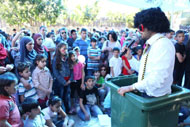
Oppression can do strange things to people. When it is oppression in the form of a decades-long military occupation, it means the occupied people run the risk of becoming one-dimensional in the sense that the occupation is what defines them and shapes their past, present and future.
For the Palestinians, this is true to a large extent. Because the Israeli occupation consumes us, preoccupies our everyday lives and effects the smallest aspects of it, we find ourselves thinking mostly about this occupation and ways to resist it, do away with it, or at least work around it.
The thing is, the Palestinians are hardly one-dimensional. The fact that the occupation has taken over so much of our lives does not mean we do not have the potential to embrace other less discouraging aspects of life itself. In the past week, Ramallah – the hub of Palestinian cultural life – has seen Palestinian Fashion Week, the Contemporary Dance Festival and a Spring Festival for children. All of the above activities have been distinctly Palestinian but they were not solely catered to the traditional theme of occupation and oppression, which the Palestinians have grown so accustomed to and believe is the only way the world views them.
At the Nuwwar Nissan Festival [The Blossoms of Spring] , children danced debka [Palestinian traditional dance] wearing Palestinian kuffiyehs around their necks. Some even had little Palestinian flags painted on their cheeks. But mostly, there were happy children with butterflies or flowers for faces, carrying balloons, eating sweets and watching puppet shows.
At the fashion show, young fresh-faced Palestinian women walked a mini runway wearing stylish spring clothes, some of which had more than a hint of Palestinian heritage. There were dresses with Palestinian embroidery in traditional black and red, jackets with distinct Palestinian markings. But overall, this was a fashion show, a chance for young entrepreneurs and fashion designers to showcase their skills, for young women into fashion to dress up and march down the catwalk and for Palestinians interested in this art form to take part in something a bit different than usual.
At the final performance of the Contemporary Dance Festival, physically disabled dancers performed incredible routines that would be a challenge for any able-bodied person. The message was twofold. Not only was it a reconfirmation that the handicapped can be part of anything they set their minds to in society and even excel where most others would fail, it was also a message forcing viewers to think outside the box. Contemporary dance incorporates unique and often bizarre concepts foreign to conservative societies but ones that allow the imagination and mind to travel to places it has never been.
This is what Palestinians are being exposed to slowly but surely. Unfortunately, there are many in this society who do not want change to come, will fight it tooth and nail and brand it as anti-Arab or anti-cultural, using religion and tradition as their crutch. But while the good and the bad comes with change, we must learn to embrace the process and the fact that it broadens our mental horizons even if we do not necessarily have a palette for fashion shows or contemporary dance or modern art. Palestine and the Palestinians are dynamic, vibrant and alive. It is not just the Israeli occupation that defines us even though it is the most imposing obstacle in our way. Let’s put it like this: once the Israeli occupation ends – and it will end without a doubt – the Palestinians need to fall back on a cultural canvas that embraces not only their collective history and culture but one which is also a space to explore infinite horizons.
Joharah Baker is a Writer for the Media and Information Department at the Palestinian Initiative for the Promotion of Global Dialogue and Democracy (MIFTAH). She can be contacted at mid@miftah.org.
There is no denying Palestinian history
Date posted: April 22, 2013
By Joharah Baker for MIFTAH
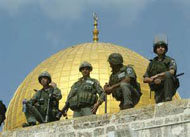
The Israeli government and settler mentality of “What is mine is mine and what is yours is mine, too” has always been a problem. Their conquest of most of Palestine in 1948 was because they were “regaining their biblical homeland”; consequently, this included the West Bank and Gaza, which it only managed to occupy 19 years later. To Israel, this was not the occupation of someone else’s land; this was part of the land of Israel, which was only now being restored to its owners. The Palestinians were nothing but – and still are – bothersome collateral damage.
For some reason, perhaps because this jungle-like mentality remained unchecked for all of these years, the sense of “everything is mine” has risen to dangerous heights. One of the most visible manifestations of this mentality is in my own back yard: the Aqsa Mosque.
Although this site is the third holiest place in Islam, where Prophet Mohammed is said to have ascended to heaven on his winged horse, the conflict over the site goes far beyond religious interpretations. In the heart of the Old City of Jerusalem, it is technically in the eastern sector of the city, under Israeli occupation. The entire world recognizes its occupation and has not recognized – at least at the official level – Israel’s unilateral annexation of the city.
That has not deterred this self-righteous mentality from impinging on places where others reside and hold sacred and dear to them. With each passing day, more and more right-wing extremist settlers and Israelis insist on entering the Aqsa Mosque Compound. They walk the grounds, try to conduct Jewish prayers and always do so under the protection of the Israeli army and police. Muslims meanwhile either bite the bullet and hope the unnatural visits end quickly or, more often than not, they protest. Hundreds of Palestinians have been arrested and injured in clashes with Israeli troops and settlers on the holy premises and others have been banned entry to it altogether.
The fact of the matter is that Israel’s official narrative – that this is the exact place where the second temple was built and where the third one will eventually be reconstructed, has become a given for so many. The premise is that Jews have every right to enter and pray in Al Aqsa because the temples came first and this is ostensibly the holiest site in Judaism. The thousands of years of history and religious significance for Muslims around the world are made completely irrelevant not to mention that the Israeli narrative can always trump anyone else’s, especially the Palestinians. The seemingly religious aspect of the argument is actually entirely political at its core.
This mentality plays out just as viciously when it comes to land and property. In Jerusalem it is about homes, in the West Bank about land. Palestinians find themselves served with papers somehow claiming that Jews had ownership rights to their house years ago, even before Israel was created. The same, it might be added, does not apply to Palestinians who lost their homes in 1948 and have the real deeds to the houses, which were stolen from them not even 70 years ago. But again, Israel’s claim over west Jerusalem is uncontested by the world and now places within east Jerusalem are as well.
It is a scary thing to see the denial of one’s history and attempts to erase it right before one’s eyes. Some extremist Jewish groups have even called for the destruction of the Dome of the Rock so that the Third Temple could be built in its place.
If there is no authority to rein in this madness, it is reasonable to say that it will continue unabated. That has been the case for years. The world, Arab, Muslim, Christian and everyone that falls in between, has a duty to preserve, not just buildings, but the history of a people that have fought long and hard to do it one their own. Palestine will never be erased in our hearts, including the Aqsa and Jerusalem. The fear is that it will be erased on the ground because no one was brave enough to challenge Israel’s belief that everything in this tiny country is exclusively theirs.
Joharah Baker is a Writer for the Media and Information Department at the Palestinian Initiative for the Promotion of Global Dialogue and Democracy (MIFTAH). She can be contacted at mid@miftah.org.
One man’s loss is another man’s gain
Date posted: April 15, 2013
By Joharah Baker for MIFTAH
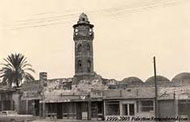
As the siren sounded this morning across Israeli communities, another siren rang somberly inside the hearts of Palestinians. Israelis are commemorating Memorial Day, honoring their fallen soldiers in Israel’s wars. This week will also mark its Independence Day, when the map of historical Palestine was redrawn and renamed as Israel.
Palestinian woes started far earlier than 1948 however. One lone Brit changed the history of Palestinians forever, British Foreign Secretary Arthur James Balfour. For the Jews, he was a savior, for the Palestinians, the man who decided their horrible fate. Thanks to a November 2, 1917 memo in which the British declared their support for the establishment of “a national home for the Jewish people”, Israel was given the international backing it needed to conquer Palestine.
Today, Israelis celebrate that conquest, praising their soldiers for the wars they fought in. For Palestinians, this is also a time of remembrance – of the loss of Palestine and of the ongoing battles they face every day in their quest for freedom and independence.
What would have happened if Mr. Balfour had not made that declaration? The course of history would definitely have been changed. It is difficult to say if the Palestinians would have been spared the agonies and displacement that came with Al Nakba in 1948, but it is fair to say that the Balfour Declaration marked a turning point in Israel’s self-proclaimed sense of ownership to this land.
Today, the Palestinians are still suffering the consequences. Kicked out of their land in 1948 and 1967 not to mention the steady dispossession of Palestinians till today, they continue to fight the premise that Israel is the sole and rightful owner to Palestine. This is an insane notion, given that there were indigenous people living on the land for thousands of years, but one the Palestinians find themselves defending nonetheless time and again.
Of course, Arthur James Balfour cannot be the only one to blame for the Palestinians’ plight. Several factors came into play that ultimately resulted in the loss of most of Palestine and the ongoing occupation of the remainder. Balfour aside, the number one culprit in maintaining the undesirable Palestinian status quo is the United States. It did not have to “promise” the Jews a homeland in Palestine because it has done everything in its power to uphold this promise day in and day out since Israel was established.
So, Israel has much to celebrate. It was promised a land and it was handed to it on a silver platter. But one man’s loss is another man’s gain and what Palestinians lost, Israel claimed as its own. Now, it is time for the Palestinians to be given the same promise. Palestine was never a land without a people and the Palestinians were never a people without a land. Its ancestors and olive trees stand testimony to this.
The leadership is willing to share, but with sharing comes justice. Palestinians will create their state on 22% of historical Palestine, but the edges cannot be shaved off or pared down to any less. And those who lost or were driven from their homes in 1948 and 1967 will always have the right to return, regardless of how that pans out on the ground. Our fallen soldiers are as precious as any other and what’s more, they continue to fall. On this Israeli Memorial and Independence Day, let the world know that Israel’s joy came on the backs of our Nakba. Israel cannot be proud of itself when it knows it built its country on the ruins of someone else’s.
Joharah Baker is a Writer for the Media and Information Department at the Palestinian Initiative for the Promotion of Global Dialogue and Democracy (MIFTAH). She can be contacted at mid@miftah.org.
Now haircuts are a problem, too?
Date posted: April 08, 2013
By Joharah Baker for MIFTAH

In the past 10 years, Palestine has changed. Now, you see young men with ponytails or the occasional tattoo. Teenage girls can be seen with bright pink streaks down their long tresses or wearing black “emo” makeup for those who think ‘the dark place” is fashionable.
We can chalk all of these things up to globalization, westernization or whatever “-ization” one prefers. We can gawk, criticize or embrace the eccentricities that are popping up in our Middle Eastern culture, but what we should not do is prohibit or quell personal choice, as long as it does no harm to others.
This is a lesson lost on the de facto Hamas government in Gaza. Since it assumed power in 2007, it has issued one oppressive social edict after another against the people of the Strip. Mostly, these edicts target women – they cannot smoke water pipes in public or have a male hairdresser cut their hair. Schoolgirls must cover their hair with a headscarf or wear the jilbab (the Palestinian equivalent to the Iranian chador). Men and women cannot walk together unless they are married (or first degree relatives) and female university students must dress “modestly” in line with Islamic culture and norms.
Men are not immune to the crackdown either. A happily ponytailed man in Ramallah is likely to be detained, beaten and his hair cut against his will if he decided to walk the streets of Gaza. This is what happened yesterday when several Gazan men were rounded up, taken into custody and forced to cut their hair, for what the Hamas-controlled police called “inappropriate hairstyles”. Before being released, they were also warned against wearing low-hung jeans as well, saying such styles were offensive to Muslim tradition and customs.
Socially, the Hamas crackdown seems to be directly proportionate to their increased political control over the Strip. Despite numerous efforts with the help of regional mediation to bring about internal reconciliation between it and Fatah, Hamas seems comfortable in its tiny, besieged coastal enclave. And the more assertive it gets politically, the tighter it seems to pull the noose socially.
This, of course, is a huge problem for Palestinians who have grown accustomed to the secular rule of the PLO. Even though Palestinian society leans more towards the conservative, there has always been wiggle room for personal style and choices. What Hamas does not seem to understand is that if they burn their bridges socially with the people – even the more conservative Gazans will eventually have enough – they will lose their political popularity as well. If elections are ever held, this will surely be reflected.
Palestinians have worked long and hard to maintain their struggle for social liberation in tandem with their ongoing political struggle for freedom. Up until now, they have been relatively successful. However, with the rise of the Muslim Brotherhood as a whole, groups like Hamas have been emboldened to take more daring steps, social agenda included.
It remains to be seen how this will play out with the Palestinians if they ever reach the ballot boxes. Probably not so well, because it does not matter if we like the ponytails, the gelled-up hair, the pink streaks or the slouchy jeans. That is not our business. It is, however, these young people’s right.
Joharah Baker is a Writer for the Media and Information Department at the Palestinian Initiative for the Promotion of Global Dialogue and Democracy (MIFTAH). She can be contacted at mid@miftah.org.
When evil is allowed to roam free
Date posted: April 01, 2013
By Joharah Baker for MIFTAH
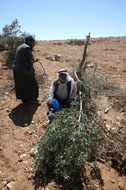
Speaking to a group of Israeli students on March 21, US President Barack Obama addressed, among other things, one aspect of Palestinian lives: “It is not just when settler violence against Palestinians goes unpunished… or to displace Palestinian families from their home. Neither occupation nor expulsion is the answer.”
What is so frustrating is the fact that President Obama is right but has done absolutely nothing with that knowledge. Settler violence in the Palestinian territories has reached unprecedented heights, most likely because these illegal settlers are given a free hand to wreak havoc on the Palestinians whenever they please. This violence is not limited to able-bodied Palestinian men either, who have half a chance of defending themselves against the brutality of these armed vigilantes. Settler violence does not discriminate, as the events of this week have proven so poignantly.
Yesterday, seven school children on a school trip north of Nablus were injured when area-settlers pelted their buses with stones, smashing the windshields. The children were taken to hospital for treatment.
On Friday, settlers attacked a farmer working his field in the village of Kufr Al Lubbad near Tulkarm. 80-year old Hasan Barhoush was brutally attacked by settlers from the Enav settlement, suffering fractured bones and bruises and is still in hospital.
Also this week, 200 olive trees were uprooted by Israeli settlers in Al Khader near Bethlehem. Uprooting trees may not seem like a direct act of violence, but for anyone who understands the significance of olive trees to Palestinians would know this is the worst kind. Olive trees not only symbolize the Palestinians’ resolve to remain on their land, they constitute a main source of livelihood for hundreds of thousands of people. When settlers forcefully cut down these trees their goal is twofold. First, this is an attempt to mark this privately-owned Palestinian land as their own – mostly to annex it to their nearby settlement. Second, it is an attempt to break the Palestinian spirit. Israelis understand the significance of the Palestinians’ love for their olive trees and their land and want to cut right at the heart. If the Palestinians have no land or trees to fall back on, they may be forced to leave, freeing the land for these predatory settlers.
One may ask how such hostile acts go unpunished. Easy. Israel’s government and law enforcement establishment turns a blind eye to settler violence against the Palestinians except in very rare cases. This means the hundreds of attacks that take place each year are accepted, even encouraged by the Israeli army, which offers protection to the gun-toting, stick-wielding settlers as they turn on Palestinians.
"When Israelis harm Palestinians, the authorities implement an undeclared policy of forgiveness, compromise, and leniency in punishment," the Israeli human rights organization B'Tselem says. "Israeli security forces have done little to prevent settler violence or to arrest offenders."
In Jerusalem, settlers roam the streets of the Old City, armed and with their fingers provocatively on the trigger. Palestinians avoid contact with them as much as possible, not out of fear as much as out of a knowledge that should an altercation take place, they will always be the one to blame. This “avoidance policy” does not always work though. Everyone recalls the incident when a young Palestinian woman was attacked by a mob of orthodox Jewish women at a light rail stop in Jerusalem. The attack was unprovoked, as was the brutal attack last year on a Palestinian youth, Jamal Joulani, by a group of Jewish youths, landing him in hospital with serious injuries.
The lopsidedness of the system is beyond ridiculous. Informed leaders such as President Obama understand this fact and realize how unjust it is. That is why he, along with the rest of the “free world” are to blame for allowing such attacks to go unpunished and for their failure to stand up for a people who do not have the same political and legal means at their disposal. Like the famous English philosopher Edmund Burke once said: “All that is necessary for the triumph of evil is for good men to do nothing.”
Israeli racism affects Christian Palestinians this Palm Sunday
Date posted: March 25, 2013
By Joharah Baker for MIFTAH
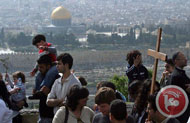
Every Easter season, the streets of Jerusalem are filled with Christian faithful carrying huge palm leaves and walking the path of Jesus as he entered the holy city. For hours, marching bands from all denominations walk through the streets with their drums and trumpets, carrying cross-adorned flags to mark the beginning of festivities ahead of Easter Sunday.
This year, the festivities took place, but with noticeably less people. While Christians from all parts of the world are free to enter Jerusalem and exercise their right to worship and freedom of movement, these same rights are denied the people who should have first bids on them: the Palestinians.
According to the PLO, only 30-40% of requested permits were granted to Christian Palestinians living in the West Bank and Gaza to enter Jerusalem for Easter. There are so many layers of wrong with this, it is difficult to know where to start. For one, Palestinians, the indigenous people of Palestine, should not have to get an Israeli-issued permit to enter their own city. Palestinians – both Christian and Muslim – have lived in Jerusalem and in all of Palestine for thousands of years; there is no other place in the world they call home. The fact that Palestinian Christians who happen to live in the West Bank or Gaza are denied entry into the city where Christ died on the cross and was later resurrected, is blasphemy in every sense of the world. This is not to mention Palestinians who were forced from their homes in Jerusalem during 1948 and 1967 wars and are now either in refugee camps or in the Diaspora. They know their homes are there, they can almost touch them, but also know they are a world away. Jerusalem is off-limits to those who know it the best.
Christian Palestinians, just like their Muslim brethren, are for the most, deprived of a basic right: that of worship. Christians and Muslims from all other the world – Africa, Europe, Southeast Asia and the Americas – come freely to Jerusalem, pray at its holy sites, smell the distinct aromas of Jerusalem and walk its historical alleyways, while Palestinians just kilometers away are forced to watch Easter mass on their living room televisions.
The injustice of this situation was made even worse this year. Perhaps because Easter this year coincided with the start of Passover, Israeli authorities were even more stringent on the entry of Palestinians. So, not only do Palestinians have to ‘ask’ for an Israeli permit to enter their own city, they were mostly denied this request. Israel sets no specific criteria for granting or denying permits but suffices to churn out the all-too hackneyed excuse of “security considerations” for turning Palestinians down. The Palestinians of course, have no legal recourse to challenge this system, which is forced upon them at random. If you want a permit, you try your luck. If they deny you, you can expect no good reason for why.
The injustice is particularly cruel given that the week is also Passover. Any Jew, everywhere and anywhere is free to come to Jerusalem, roam its streets, pray in its synagogues and even visit Christian sites, with complete freedom. Jews don’t need passes or permits. On the contrary, they are encouraged to visit and hopefully to stay, exercising their “right of return.” Israel is always seeking to control the demographics of Jerusalem with, at most, a 70-30 ratio between Jews and Arabs. What easier way then to systematically deny Palestinians entry while encouraging Jews to take their place?
This Easter, just like every Muslim Eid, many Palestinians are denied the joy of visiting their most loved city. While Israel allows this right to foreigners, Christians and Jews and even Muslims (as long as they are not Palestinian) and boasts of being the only sustainable democracy in the region, the world forgets how each year thousands of Palestinians from both faiths feel the sting of being close enough to Jerusalem to see the tops of its minarets and churches but realize, if they reach for it, their hands and feet are shackled to the ground.
Joharah Baker is a Writer for the Media and Information Department at the Palestinian Initiative for the Promotion of Global Dialogue and Democracy (MIFTAH). She can be contacted at mid@miftah.org.
14 Emil Touma Street,
Al Massayef, Ramallah
Postalcode P6058131
P.O.Box 69647
Jerusalem
972-2-298 9490/1
972-2-298 9492
info@miftah.org






